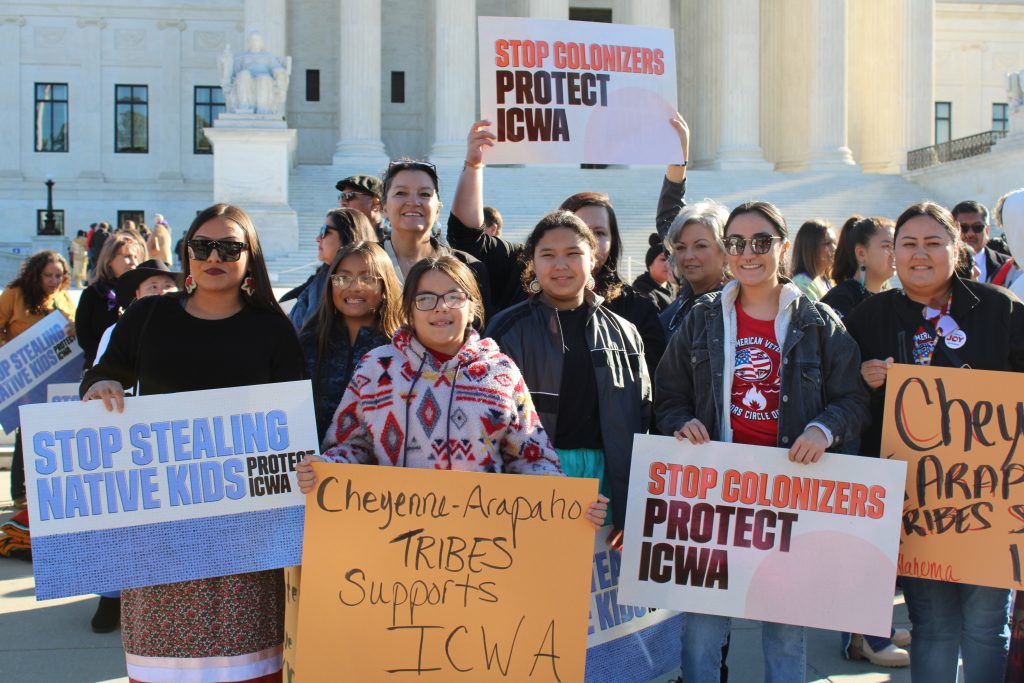“By ruling on the side of children’s health and safety, the U.S. Constitution, and centuries of precedent, the justices have landed on the right side of history,” said one Cherokee chief.
By Brett Wilkins. Published 6-15-2023 by Common Dreams

In what one chief called “a major victory” for Native American tribes, the United States Supreme Court on Thursday upheld a federal law enacted to protect Indian children from being separated from their families.
The justices’ 7-2 decision in Haaland v. Brackeen leaves intact the Indian Child Welfare Act (ICWA), a 1978 law passed in response to over a century of Native American children being taken from their relatives and often placed in state or religious institutions or with white families.
“Today, the Supreme Court once again ruled that ICWA, heralded as the gold standard in child welfare for over 40 years, is constitutional,” Cherokee Nation Principal Chief Chuck Hoskin Jr. said in a statement. “Today’s decision is a major victory for Native tribes, children, and the future of our culture and heritage. It is also a broad affirmation of the rule of law, and of the basic constitutional principles surrounding relationships between Congress and tribal nations.”
“We hope this decision will lay to rest the political attacks aimed at diminishing tribal sovereignty and creating instability throughout Indian law that have persisted for too long,” Hoskin added. “By ruling on the side of children’s health and safety, the U.S. Constitution, and centuries of precedent, the justices have landed on the right side of history.”
The Supreme Court handed down a major decision Thursday in the Haaland v. Brackeen case, affirming the constitutionality of the Indian Child Welfare Act by a 7-2 vote.
— Lakota People's Law Project (@lakotalaw) June 15, 2023
The decision represents a major victory for federal Indian law. https://t.co/nOCK9mcShA
The ICWA gives preference to Native American families in adoption and foster care proceedings, a policy challenged by a white couple, the state of Texas, and others, who claimed the law is race-based and therefore violates the equal protection clause of the 14th Amendment.
Chad and Jennifer Brackeen, a Texas couple, had already adopted a Navajo boy and are also trying to adopt his half-sister, who is 4 years old and has lived with them since she was an infant. The Navajo Nation opposes the adoption.
“Before us, a birth mother, foster and adoptive parents, and the state of Texas challenge the act on multiple constitutional grounds. They argue that it exceeds federal authority, infringes state sovereignty, and discriminates on the basis of race,” Justice Amy Coney Barrett wrote for the majority. “The United States, joined by several Indian tribes, defends the law.”
In addition to the Navajo, the Cherokee, White Earth Band of Ojibwe, and Ysleta del Sur Pueblo tribes were defendants in the case.
“The issues are complicated,” Barrett added. “But the bottom line is that we reject all of petitioners’ challenges to the statute, some on the merits and others for lack of standing.”
Justice Barrett's 7–2 opinion for the court holds that the Indian Child Welfare Act does NOT exceed Congress' constitutional authority or violate the anti-commandeering doctrine. She dismisses nondelegation and equal protection claims on standing. https://t.co/spqRRwCZSW
— Mark Joseph Stern (@mjs_DC) June 15, 2023
Justices Samuel Alito and Clarence Thomas dissented, with the latter writing that “the Constitution confers enumerated powers on the federal government. Not one of them supports ICWA.”
Justice Brett Kavanaugh concurred with the majority but wrote that the ICWA’s race-based nature—specifically a hypothetical scenario in which “a prospective foster or adoptive parent may in some cases be denied the opportunity to foster or adopt a child because of the prospective parent’s race”—raises “significant questions under bedrock equal protection principles and this court’s precedents.”
“Courts, including ultimately this court, will be able to address the equal protection issue when it is properly raised by a plaintiff with standing—for example, by a prospective foster or adoptive parent or child in a case arising out of a state-court foster care or adoption proceeding,” Kavanaugh added.
Her parental rights were terminated, meaning she was no longer legally her daughter’s mother.
— ProPublica (@propublica) June 15, 2023
But then the state's highest court ruled that under the Indian Child Welfare Act, her parental rights should be restored.
Today, the Supreme Court upheld ICWA. https://t.co/5tGKdlud45
Before passage of the ICWA, between 25% and 35% of Native American children were being taken from their homes and placed with other families for adoption, in foster care, or in church- or state-run institutions.
During and after the peak decades of the U.S. genocide against the Western Indians, vanquished tribes were forced to send their children to boarding schools to be “civilized.” Under the mantra “kill the Indian, save the man,” hundreds of thousands of Native children suffered this cultural genocide. Many never returned home again, as diseases claimed many lives. Parents who resisted giving up their children were often imprisoned, sometimes on California’s foreboding Alcatraz Island.
The 2021 discovery of hundreds of Indigenous children buried in unmarked graves at a Canadian boarding school prompted U.S. Interior Secretary Deb Haaland to write about how her Laguna Pueblo grandparents were stolen from their families when they were 8 years old in “an effort to eradicate our culture and erase us as a people.”
My full statement on the Supreme Court’s decision to uphold the Indian Child Welfare Act pic.twitter.com/V8e97j1sgg
— Secretary Deb Haaland (@SecDebHaaland) June 15, 2023
Responding to Thursday’s Supreme Court ruling, Haaland said that “for nearly two centuries, federal policies promoted the forced removal of Indian children from their families and communities through boarding schools, foster care, and adoption.”
“Those policies were a targeted attack on the existence of tribes, and they inflicted trauma on children, families, and communities that people continue to feel today,” she added. “Congress passed the Indian Child Welfare Act in 1978 to put an end to those policies.”
This work is licensed under Creative Commons (CC BY-NC-ND 3.0)

